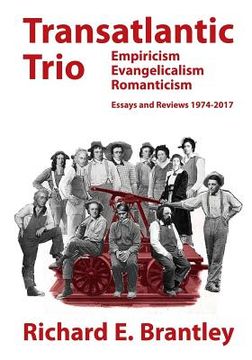Compartir
Transatlantic Trio: Empiricism, Evangelicalism, Romanticism: Essays and Reviews, 1974-2017 (en Inglés)
Richard E. Brantley
(Autor)
·
Culicidae Press
· Tapa Blanda
Transatlantic Trio: Empiricism, Evangelicalism, Romanticism: Essays and Reviews, 1974-2017 (en Inglés) - Brantley, Richard E.
$ 83.855
$ 104.819
Ahorras: $ 20.964
Elige la lista en la que quieres agregar tu producto o crea una nueva lista
✓ Producto agregado correctamente a la lista de deseos.
Ir a Mis Listas
Origen: Estados Unidos
(Costos de importación incluídos en el precio)
Se enviará desde nuestra bodega entre el
Martes 11 de Junio y el
Martes 25 de Junio.
Lo recibirás en cualquier lugar de Argentina entre 1 y 3 días hábiles luego del envío.
Reseña del libro "Transatlantic Trio: Empiricism, Evangelicalism, Romanticism: Essays and Reviews, 1974-2017 (en Inglés)"
From the Prologue of the book: Francis Jeffrey's indictment of William Wordsworth's The Excursion (1814) as "mystical verbiage of the Methodist pulpit"-"This will never do!"-will itself never do (Jeffrey 463, 465). Charles Lamb's praise of The Excursion as "natural methodism" provides a fuller, more positive clue to the historical, interdisciplinary resonance of Romanticism (Lamb 2:149). Lamb's two-word mouthful offers versatile insight, bears interpretive weight. This phrase signals how the rival traditions of empiricism and evangelicalism come together to embroider not just Wordsworth's art, but Romantic literature throughout the English-speaking world. A lower-case but not entirely secularized swerve to evangelicalism spins volumes about how 19th-century poetic faith willingly suspends disbelief: the free-wheeling swing of Romantic-era creativity proclaims interconnection. The combination of "natural" and "methodism" opens a critic's pathway. British empiricism and transatlantic revivalism strike sparks off the literary imagination of a bi-national Romantic Movement. On United Kingdom/United States shores, faith in experience and experiential Faith rise inexorably to converge at the crossroads of an inspired transatlantic artistry, a prime location-and locator-of creative authority. Lamb's label pinpoints a cache of Anglo-American Romantic power. This natural methodism counts as a bi-nationally indigenous, religious as well as philosophical equivalent to M. H. Abrams's magisterially philosophical emphasis on how Continental European Natural Supernaturalism applies to British Romanticism (Abrams, 1971). This arc from the late 17th to the middle 19th century encompasses John Locke (1632-1704), John Wesley (1703-91), Jonathan Edwards (1703-58), and the method of Anglo-American Romanticism. This one curve of that great timeline gives meaning perhaps even to such a spontaneous overflow recollected in tranquility as the signature middle-century question asked by Emily Dickinson (1830-86) as late as 1862: "Dare you see a Soul at the White Heat?" (Poem 365, 1). For the remainder of this segment to draw out the implication of Jeffrey's negative assessment and Lamb's favorable judgment of Wordsworth's poetry is to announce that wielding natural methodism along that arc from high-to-late Romanticism of the Anglo-American world is the procedure and the concept of this essay. [...] Browsers among these essays and reviews may wish to consider whether or not British empiricism and the empirical evangelicalism of the Anglo-American world can each in its own right prove as worthy to be read for its manner as for its thoughts. Readers might also stay alert to how the confluence of empirical philosophy and evangelical faith in the neoclassic-to-Romantic imagination helps explain 19th-century authors as aficionados of the realistic and of the preternatural at one and the same time. From their varying but corresponding points of view, these thirty-eight reissues do not just examine, but dwell in the possibility of, intellectual, emotional, and imaginative re-integration.

